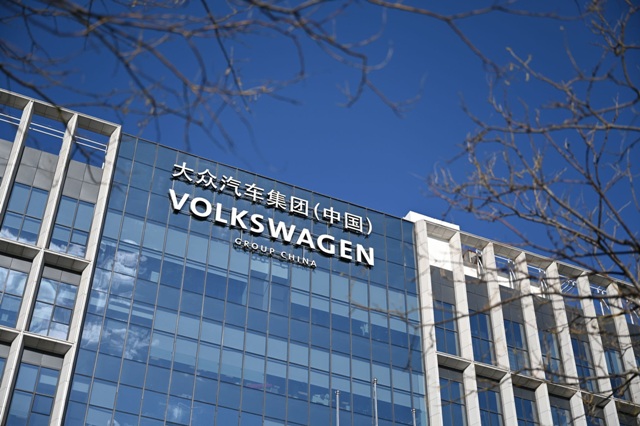By Johannes Neudecker and Jörn Petring, dpa
Volkswagen divests from China over human right issues

XIANJIANG, China – German carmaker Volkswagen is withdrawing from its controversial involvement in a factory in China’s Xinjiang province, which has attracted criticism over alleged human-rights abuses of the Uighur minority.
Volkswagen sold the plant in the city of Urumqi, which was jointly operated with the Chinese state-owned company SAIC Motor Corporation as a partner, the Volkswagen Group announced on Wednesday.
The buyer is the Chinese state-owned company SMVIC, which is active in the used car business. VW also sold test tracks in Turpan and Anting in the Chinese province. VW investigated the allegations of abuse, but the company cited economic reasons for the sale of the plant. The future of the plant had been negotiated for months.
Investors welcome move
Several Volkswagen shareholders welcomed the decision to divest from the controversial factory. Janne Werning from Union Investment called it “a long overdue step that shows that human rights are not negotiable,” but added that weak corporate governance at the carmaker remain “VW’s Achilles heel.”
Deka Investment’s Ingo Speich said that with the move, “VW is putting an end to the controversial discussions.”
The western German state of Lower Saxony, which holds a large stake in VW, expressed its satisfaction with the decision in a statement “welcoming” the move. The state’s premier, Stephan Weil, and his deputy, Julia Willie Hamburg, both hold seats on the VW Group’s supervisory board.
VW has not built cars in Xinjiang since 2019. At its peak between 2015 and 2019, the plant employed around 650 people, according to VW. In recent years, the plant has handled technical adjustments and tests on vehicles.
The plant opened in 2013, and the initial contract between VW and SAIC was due to run until 2029. According to VW, SAIC held the controlling stake at the site, where vehicles were once assembled for sales in western China.
However, the project failed in the weaker than expected market. At the same time, the German carmaker announced that it had extended a cooperation agreement with SAIC on Tuesday for a further 10 years. The deal will now run until 2040.
However, Volkswagen said there is no connection between the withdrawal from the Xinjiang plant, which was sealed a few days ago, and the contract extension.
Abuse allegations
Serious allegations of human rights violations due to forced labour at the plant have been made in recent years. Many Uighurs – a Muslim minority in China – live in Xinjiang.
According to human rights activists, hundreds of thousands of Uighurs have experienced years of oppression, have been forced to work or have been sent to re-education camps. China has cited a series of attacks by extremists to justify the crackdown on Muslim minorities, but denies allegations of rights abuses.
Following the allegations in the summer of 2023, VW commissioned a company to investigate the working conditions at the plant and look into the allegations.
In December, the auditors announced that they had found no evidence or proof of forced labour among the employees. Critics complained that the anonymity of the employees questioned in the investigation had not been adequately protected.
New VW models for Chinese market
VW plans to launch a new product offensive in China from 2026 and bring 18 new models from the company’s Volkswagen and Audi brands onto the market in partnership with SAIC by the end of the decade. Fifteen of the vehicle models will be exclusive to the Chinese market. By 2030, the VW Group aims to sell 4 million cars a year and achieve a market share of 15% in China.
According to VW, last year’s share was 14.5%.
Partnership since the 80s
Volkswagen founded a joint venture with the Shanghai Automotive Industry Corporation (SAIC) back in the 1980s, which laid the foundation for VW’s lucrative expansion in the Chinese market. This was later followed by the establishment of another joint venture with China First Automobile Works (FAW).
In 2017, VW also founded a joint venture with Anhui Jianghuai Automobile (JAC) focused on the development and production of electric vehicles. Volkswagen has also entered into a strategic partnership with the Chinese electric vehicle manufacturer Xpeng.
For many years, Chinese authorities required foreign car manufacturers in China to produce their vehicles exclusively through joint ventures with local partners. A number of foreign carmakers agreed, as the deals made it possible to gain access to the huge Chinese market. But the arrangement also led to technology transfers to Chinese firms.
In recent years, Beijing began to relax the regulations until the restrictions were finally lifted completely in 2022. Volkswagen has nevertheless held on to its Chinese partners. The VW Group now operates a total of 38 factories in the People’s Republic, not including the Urumqi plant.
VW facing crisis
There have been unconfirmed reports that VW may further cut its production capacity in China, perhaps exiting a plant in Nanjing in eastern China.
The German carmaker is currently facing a crisis, and has been threatening to close factories in Germany and lay off tens of thousands of workers amid concerns about costs and intense competition. The situation for Volkswagen in China, which the carmaker once relied on for outsized profits, has also clearly deteriorated as upstart Chinese rivals have gained market share with sleek new all-electric models.
According to industry observers, Volkswagen was too slow to launch electric drivetrains in China and has been plagued by high costs with low capacity utilization.
VW followed suit with electric cars built specifically for the Chinese market, but Chinese brands such as BYD and Li Auto have so far been able to beat the competition in a fierce price war. VW expects 2025 to again be a difficult year in the market, but has expressed the hope that the situation will begin improving in 2026.

